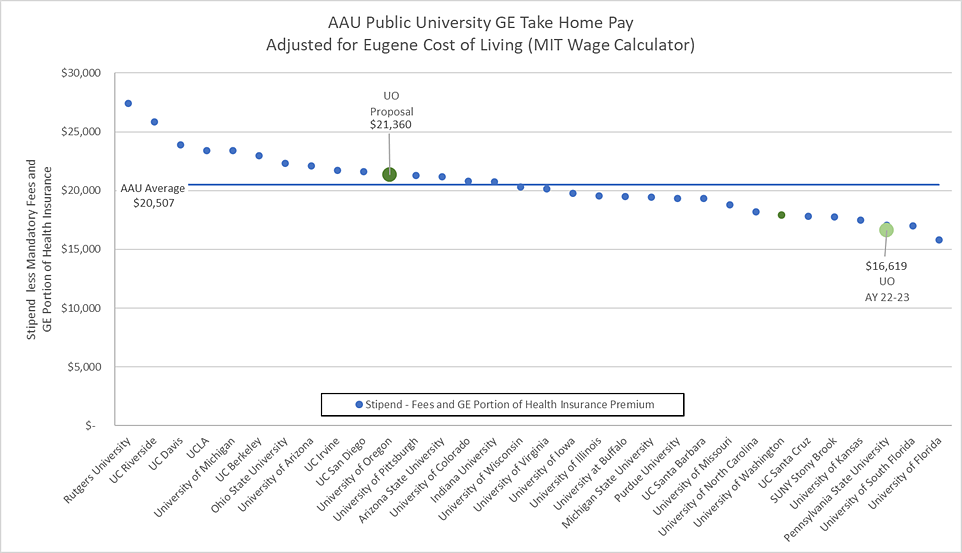Salary increases for graduate student employees are at the crux of negotiations between the University of Oregon and the Graduate Teaching Fellows Federation as they seek to reach agreement for a successor contract. The UO and the GTFF met on Thursday, Nov. 30, to continue negotiations with the state-appointed mediator. The bargaining teams reached tentative agreement on all outstanding articles except the salary article.
At the Nov. 30 mediation session, the UO bargaining team increased its previous salary offer for both minimum salaries and across-the-board increases in the first year of the contract. The new proposed minimum rate for all GEs is $33.89 per hour or $2,433 per month at 0.49 full-time equivalency. GEs are employed at less than half-time so they can fulfill their student responsibilities as they make academic progress toward degree completion.
The collective bargaining agreement sets a minimum salary for graduate employee pay. However, departments within schools and colleges and principal investigators may set pay rates above the minimum requirement. Of the 1,435 GEs employed for the fall term, 45 percent are paid at the minimum salary with 55 percent above.
“The latest UO offer provides salary increases for all GEs and raises GE salaries in comparison to peer institutions within the Association of American Universities to improve the UO’s competitive position when retaining and recruiting GEs,” said Krista Chronister, vice provost of graduate studies.
The university’s offer moves away from differentiating pay across three levels to a new model setting all GE levels to a unified minimum salary rate at 7 percent above the current GE III level. This results in greater increases for GEs at the lower levels. Those at a GE I level would receive a 27.64 percent increase, and a GE II would receive a 12.98 percent increase effective immediately upon the ratification of a successor contract. The offer also includes a 3.75 percent increase to the minimum salary in each subsequent year of the contract.
The table below illustrates the annual increases for GEs currently paid at a minimum rate with a 0.49 FTE appointment:
Current Levels | Current | Proposed | Percentage Increase in Year 1 | Percentage Increases in Year 2 and 3 | Percentage Increase Over |
|---|---|---|---|---|---|
GE I | $17,155 | $21,896 | 27.64% | 3.75% | 35.14% |
GE II | $19,380 | $21,896 | 12.98% | 3.75% | 20.48% |
GE III | $20,457 | $21,896 | 7.00% | 3.75% | 14.50% |
Note: Graduate employees with a full three-term appointment at 0.49 FTE work 646 hours. Regular 12-month employees at 1.0 FTE work 2,080 hours.
In addition to increases to the minimum salary requirement, the latest UO offer provides across-the-board pay increases in each year of the contract for GEs currently earning above the minimum. In year one, the offer sets a department base-rate threshold with a higher percent increase for those below the threshold than above. This results in more money for GEs at lower pay rates, while still increasing GE pay for those in units that have already set GE pay significantly higher than the minimum rates in the current collective bargaining agreement. The latest offer provides a 13 percent total salary increase for those below the base-rate threshold and 10 percent for those above.
Contract Year | Base Rate Threshold = $50,000 at 1.0 FTE equivalent (9-month) |
|---|---|
Year 1 | Below threshold = 7% |
Year 2 | 3% for all |
Year 3 | 3% for all |
Total | Below threshold = 13% |
Information provided by the Office of the Senior Vice President for Finance and Administration shows that, with the UO’s latest offer, GEs would earn above the average minimum take-home pay rate of the other public AAU institutions when adjusted for cost-of-living differences between regions. The analysis compares the minimum salary of a UO GE to those at other public AAU institutions and focuses on take-home pay after GE contributions for mandatory fees and health insurance premiums, with cost-of-living adjustments based on the MIT Living Wage Calculator.

The most recent offer from the GTFF was presented on Nov. 20. It maintains three GE levels at different minimum pay rates and applies the same percent increase to each. The GTFF proposes salary increases to the minimum rates of 20 percent in year one, 10 percent in year two and 7.75 percent in year three. Their offer also includes across-the-board increases for GEs above the minimum salary at 13 percent in year one, 8 percent in year two and 5.75 percent in year three.
Minimum Salary | Year 1 | Year 2 | Year 3 | Total |
|---|---|---|---|---|
GE I | 20% | 10% | 7.75% | 37.75% |
GE II | 20% | 10% | 7.75% | 37.75% |
GE III | 20% | 10% | 7.75% | 37.75% |
Across-the-board Increases | 13% | 8% | 5.75% | 26.75% |
Visit the Office of Human Resources website for more information about the UO’s and GTFF’s latest salary offers.
The bargaining teams have reached tentative agreement on all remaining articles except for the salary article. The agreements address issues such as fees and health insurance contributions paid by GEs during the summer, the university’s contribution to administrative expenses for the GE health insurance program, access to UO One Card, a credit card for business travel expenses, and the number of weeks of unpaid leave while a GE is on family or medical leave.
A complete list of the articles with tentative agreements and an overview of the agreed to terms is available on the HR website.
Negotiations between the university and the union continue in mediation. The bargaining teams and the state-appointed mediator are discussing availability, with dates likely to be set in early January. Refer to bargaining updates on the HR website to stay up to date on developments.
Bargaining follows a statutory timeline. The GTFF declared impasse on Oct. 19, which initiated a thirty-day cooling off period that ended on Nov. 25. Now that bargaining is outside of the cooling off period, the union can legally strike following a 10-day notice to the university.
“Reaching agreement on a successor contract that best serves graduate student employees and the university is a top priority. While we are optimistic about reaching agreement with the GTFF, an academic disruption remains a real possibility. As we continue to engage in good-faith bargaining, we also have an obligation to ensure academic continuity,” said Janet Woodruff-Borden, interim provost and executive vice president. “It is critical as we continue to work toward a successor contract that we continue to support all undergraduate and graduate students’ academic progress and our research activities to ensure minimum disruption to the greatest extent possible.”


